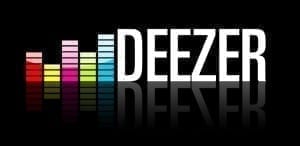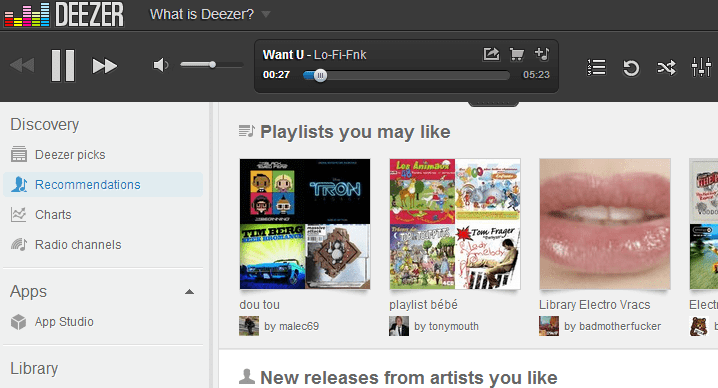
After using Spotify for a long time, I subscribed to Deezer a few months ago. A few weeks ago, I was surprised to receive only "What's-his-name is now following your musical activities" email alerts from the platform. As far as I remember, I never received newsletters or any other email talking about music.
However, I am a faithful user of the platform, I use it several times a week and it is even connected to my Last.fm account.
A problem of commitment?
While searching a bit in Gmail, I noticed that Deezer had in fact sent me many newsletters and music alerts (on average two per month since the beginning).
The problem? They all fell into the "Promotion" folder of Gmail!
What does this mean? In Gmail, there are two relatively new mechanisms (less than two years old) that allow you to sort emails automatically:
- Priority Inbox This is a mechanism that manages the degree of engagement of the user with the emails he receives. The more a sender is read, clicked or replied to, the higher the priority. On the other hand, if an email sender is never opened, or worse, has his emails deleted directly, he will gradually disappear from the Gmail mailbox.
- SmartLabels This is a feature that exists only through the Gmail Lab (so you have to activate it voluntarily). It allows you to automatically classify emails in different categories: Promotions, Notifications, Social Updates, Forums, Other.
At the beginning of the relationship, the subscriber, even if the message is classified as "Promotion", will receive the email in his main mailbox, but if his level of engagement is low, little by little, he might not see the email anymore (that's what happened here with Deezer).
Here it is specific to Gmail, but all the players have implemented or are in the process of implementing the same type of mechanism, such as Outlook.com, which is already very advanced in this area, or in France SFR which implements a content categorization.
Need help?
Reading content isn't everything. The best way is to talk to us.

Engage with personalized content from the beginning of the relationship
If you look at what Deezer sent me as my first content ... you can already see that it took five weeks from registration to the first email. The advantage of five weeks is that Deezer would have already had the opportunity to check my listening habits. Unfortunately, there was no chance that I would open the first email I received, which was about the new album of Tom Dice (not very close to what I listen to).
Why wait five weeks ... and why not personalize (with something other than geographic preferences)? Yet, Deezer encourages its users to connect via Facebook and asks by default for permission to retrieve Likes from its subscribers. Via Facebook's OpenGraph, it is very easy (https://graph.facebook.com/userid/music) to retrieve the favorite artists on a profile. Moreover, there is a strong chance that the most music-loving users will also connect their Last.fm accounts, which can retrieve very interesting information about the musical tastes of their subscribers.
All this data coupled with the first listening observed on Deezer could allow to personalize in a very important way the newsletters (by making for example suggestions related to the musical tastes).
Another untapped aspect of email personalization is the generation of statistics related to the subscriber's use of the platform, but also the use of Deezer by his friends. These are notions that are present in the platform itself, but that are not exploited in the emailings. Yet, this would be a very powerful way to generate engagement.
A huge potential
As you can see, Deezer has a huge potential for several reasons:
- Huge opportunity to generate behavioral data;
- Strong link with data available on social networks;
- A social dimension of music with the activity of "friends" on the platform;
- A strong expectation from music consumers who want to receive recommendations.
Unfortunately, this potential is still not well tapped, but Deezer is not alone in this. The challenge for many companies in 2013 is to start leveraging Big Data, and emailing is a very good entry point.
One Response
The real challenge of Big Data is to make the multi-channel data in its possession usable. This requires both technology and human expertise to make sense of the data.
I would like to share with you the mural from the ebg Barcamp on Big Data, which illustrates how data can be transformed into action in email marketing http://bit.ly/T5Ug5F
Thank you Jonathan for this interesting article.